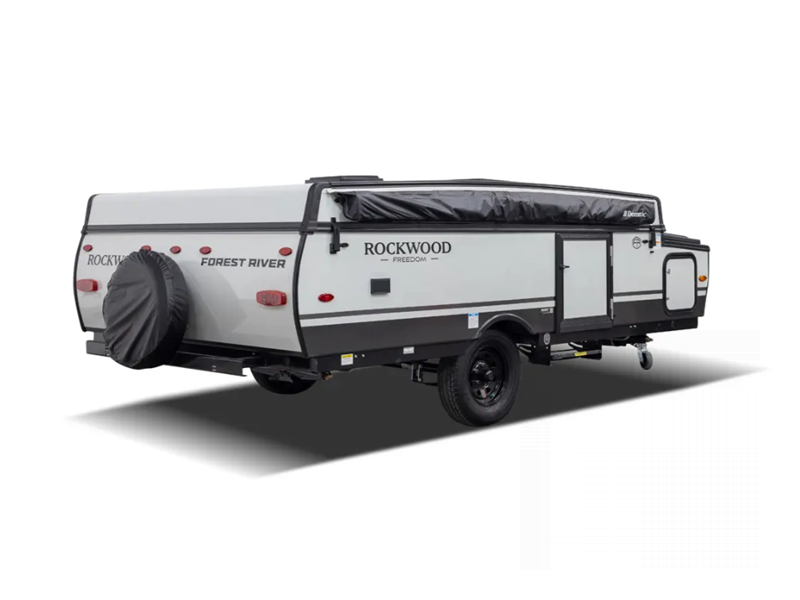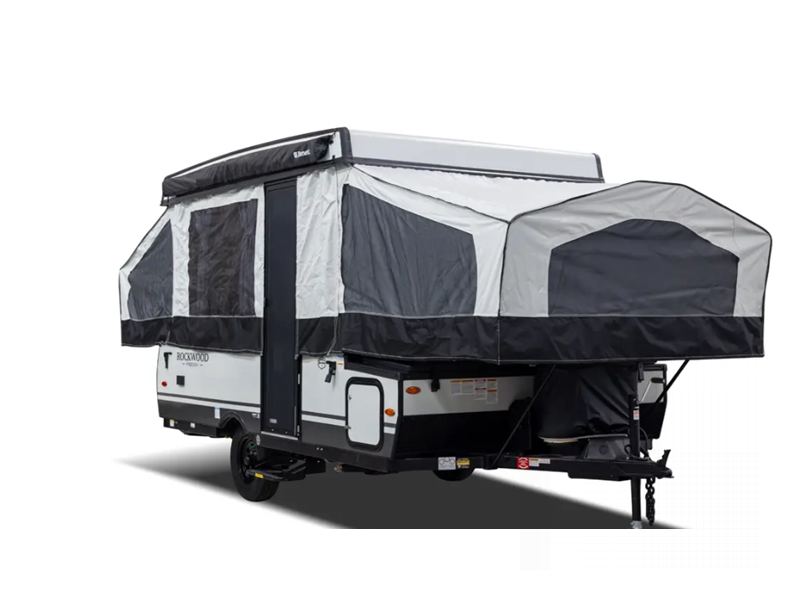Are you thinking about getting a pop up tent trailer but worried about its weight? Knowing exactly how much a pop up tent trailer weighs can make a big difference in your travel plans.
It affects your vehicle choice, fuel efficiency, and even where you can take your trailer. You’ll discover the typical weight ranges and what factors influence the weight. By the end, you’ll feel confident about choosing the right trailer for your adventures without any surprises.
Keep reading to find out everything you need to know!

Credit: www.mortonsonthemove.com
Pop Up Tent Trailer Basics
Pop up tent trailers are small trailers that fold down for easy travel. They open up to create a camping space with a tent-like feel.
These trailers are lighter and easier to tow than many other campers. They provide a simple way to enjoy outdoor camping with more comfort.
What Is A Pop Up Tent Trailer
A pop up tent trailer is a compact camper that folds down flat for towing. When parked, it expands to form a tented living area.
The frame is usually made of metal, and the walls are soft fabric tents. It often includes basic camping features like beds and storage.
Common Uses And Benefits
Pop up tent trailers are popular for weekend camping trips and family vacations. They offer a quick setup and take down process.
They are lighter than hard-sided campers, making them easier to tow with smaller vehicles. This saves fuel and reduces towing stress.
- Easy to tow and park
- Quick setup and takedown
- Comfortable sleeping space
- Good ventilation with tent walls
- Affordable compared to larger RVs

Credit: www.sylvansport.com
Factors Influencing Weight
The weight of a pop up tent trailer changes based on several factors. Knowing these helps you choose the right trailer.
These factors include what the trailer is made of, how big it is, and what extra features it has.
Materials And Construction
The materials used for the frame and body affect the trailer’s weight. Steel frames are strong but heavy. Aluminum frames weigh less but cost more.
- Steel frames add weight but increase durability
- Aluminum frames reduce weight and resist rust
- Canvas or nylon for tents affects overall mass
- Quality of joints and fasteners can add extra weight
Size And Capacity
Bigger trailers carry more gear and people but weigh more. Size usually links to length, width, and height.
| Trailer Size | Approximate Weight |
|---|---|
| Small (10-12 feet) | 700 to 1,200 pounds |
| Medium (13-16 feet) | 1,200 to 1,800 pounds |
| Large (17+ feet) | 1,800 to 2,500+ pounds |
Additional Features And Accessories
Extra items add convenience but increase weight. Some trailers include kitchens, heaters, or extra storage.
- Built-in kitchen units add 100 to 300 pounds
- Water tanks and plumbing increase weight
- Heating systems and air conditioners add extra load
- Storage compartments and awnings add weight
Typical Weight Ranges
Pop up tent trailers come in different weights. The weight depends on size and features. Knowing the weight helps with towing and storage.
Below are the common weight ranges for various types of pop up tent trailers. This helps you pick the right model for your needs.
Lightweight Models
Lightweight pop up tent trailers usually weigh between 700 and 1,200 pounds. They are easy to tow with small cars or SUVs. These models are great for quick trips and simple camping.
They have fewer features but still offer basic shelter. Their compact size makes them easy to store in small spaces.
- Weight range: 700-1,200 lbs
- Ideal for small vehicles
- Basic features and smaller size
- Easy to store and tow
Mid-range Models
Mid-range pop up tent trailers weigh between 1,200 and 2,000 pounds. They offer more space and extra features like kitchenettes or storage compartments. These trailers suit families or longer camping trips.
They need midsize SUVs or trucks for towing. The extra weight means more stability on the road and more comfort at the campsite.
- Weight range: 1,200-2,000 lbs
- More living space and features
- Best for families and longer trips
- Requires midsize SUV or truck
Heavy-duty Models
Heavy-duty pop up tent trailers weigh over 2,000 pounds. They include full kitchens, bathrooms, and extra sleeping areas. These trailers give you the most comfort and space.
They need strong trucks for towing. Their weight makes them stable but less easy to maneuver. These models are good for long trips or full-time camping.
- Weight: over 2,000 lbs
- Full kitchens and bathrooms
- Extra sleeping and living space
- Require strong trucks for towing
Weight Comparison With Other Trailers
Pop up tent trailers are known for being lightweight and easy to tow. Comparing their weight to other trailers helps buyers understand their benefits. This guide looks at standard travel trailers, teardrop trailers, and truck campers.
Knowing the weight differences helps you pick the right trailer for your vehicle and travel plans. Let’s explore each trailer type and how they compare to pop up tent trailers.
Standard Travel Trailers
Standard travel trailers are larger and heavier than pop up tent trailers. They offer more space and amenities but need stronger towing vehicles. Their weight usually ranges from 3,000 to 8,000 pounds.
- Pop up tent trailers weigh about 1,000 to 2,000 pounds.
- Standard travel trailers weigh about 3,000 to 8,000 pounds.
- This means standard trailers can be 2 to 6 times heavier.
Teardrop Trailers
Teardrop trailers are small, compact, and usually lighter than standard trailers. Their weight is closer to pop up tent trailers but still a bit heavier on average.
| Trailer Type | Average Weight (pounds) |
|---|---|
| Pop Up Tent Trailer | 1,000 – 2,000 |
| Teardrop Trailer | 1,200 – 2,500 |
Truck Campers
Truck campers fit into the bed of a pickup truck. They can be heavier than pop up tent trailers because of their solid build. Weight varies widely based on size and features.
| Trailer Type | Weight Range (pounds) |
|---|---|
| Pop Up Tent Trailer | 1,000 – 2,000 |
| Truck Camper | 1,500 – 4,000 |
Impact Of Weight On Towing
The weight of a pop up tent trailer affects how you tow it. Knowing this weight helps you plan for safe and smooth travel.
Understanding the impact of weight helps with vehicle choice, fuel use, and safety on the road.
Vehicle Requirements
Your vehicle must handle the trailer’s weight. Check the towing capacity before you hook up the trailer.
- Know the trailer’s gross weight, including gear and supplies.
- Confirm your vehicle’s maximum towing limit.
- Use proper hitch equipment rated for the trailer’s weight.
- Check tire pressure and brake systems on both vehicle and trailer.
Fuel Efficiency
Heavier trailers lower your fuel efficiency. Your vehicle works harder to pull the extra weight.
| Weight of Trailer | Estimated Fuel Efficiency Impact |
| Light (Under 1,000 lbs) | Minimal impact |
| Medium (1,000 to 2,500 lbs) | 10% to 20% reduction |
| Heavy (Over 2,500 lbs) | 20% or more reduction |
Safety Considerations
Weight affects your control and braking distance. Keeping weight within limits is key for safe towing.
- Distribute weight evenly inside the trailer.
- Do not overload beyond your vehicle’s capacity.
- Check trailer lights and brakes before each trip.
- Drive slower and allow more distance for stopping.
Tips To Manage Trailer Weight
Pop up tent trailers have different weights depending on size and features. Managing the weight helps with safety and fuel efficiency.
Using smart tips can make towing easier. Keep your trailer light and balanced for better control on the road.
Choosing Lightweight Accessories
Pick accessories that are light but still strong. Heavy items add extra weight and make towing harder.
Look for items made from aluminum or plastic instead of steel. These materials weigh less and last long.
- Use lightweight folding chairs and tables
- Choose compact cooking gear made from light materials
- Bring only essential tools and equipment
Packing Strategies
Pack smart to keep the weight balanced. Put heavy items low and near the trailer axle.
Avoid overpacking. Take only what you really need for your trip to reduce weight.
- Distribute weight evenly on both sides
- Use soft bags instead of hard boxes
- Secure items to prevent shifting during travel
Regular Maintenance
Check your trailer often to keep it in good shape. Well-maintained parts work better and weigh less over time.
Remove any old or broken parts that add unnecessary weight. Keep tires properly inflated to avoid extra drag.
- Inspect and clean trailer frame and wheels
- Lubricate moving parts for smooth operation
- Replace worn tires with lighter, durable ones

Credit: www.rvcanadaottawa.ca
Frequently Asked Questions
What Is The Average Weight Of A Pop-up Tent Trailer?
The average weight of a pop-up tent trailer ranges from 1,200 to 2,400 pounds. This can vary based on size and features. Lightweight models are easier to tow with smaller vehicles. Heavier models may require a more powerful vehicle. Always check your vehicle’s towing capacity before purchasing.
How Does Weight Affect Towing A Pop-up Tent Trailer?
Weight significantly impacts your vehicle’s towing capability. Heavier trailers require more power to tow safely. Overloading can strain your vehicle’s engine and brakes. Ensure your vehicle’s towing capacity matches the trailer’s weight. Proper weight distribution is essential for safe and smooth towing.
Are Lightweight Pop-up Tent Trailers Durable?
Yes, lightweight pop-up tent trailers are generally durable. They are built with strong materials like aluminum and fiberglass. Despite being lightweight, they are designed to withstand various weather conditions. Regular maintenance can enhance their lifespan and reliability. Always check the manufacturer’s specifications for durability details.
What Factors Influence A Pop-up Tent Trailer’s Weight?
Several factors influence a pop-up tent trailer’s weight. These include materials used, size, and included amenities. Features like kitchens or bathrooms add extra weight. The construction type and frame material also play a crucial role. Consider all these factors when choosing a trailer that suits your towing capacity.
Conclusion
Pop up tent trailers weigh between 1,000 and 3,000 pounds. Weight depends on size, materials, and features. Knowing the weight helps plan towing and travel safely. Choose a trailer that fits your vehicle’s capacity. Light trailers are easier to tow and park.
Heavier ones offer more space and comfort. Always check the manufacturer’s weight specs before buying. This ensures a smooth camping trip without surprises. Understanding weight makes your outdoor adventure better and safer.
